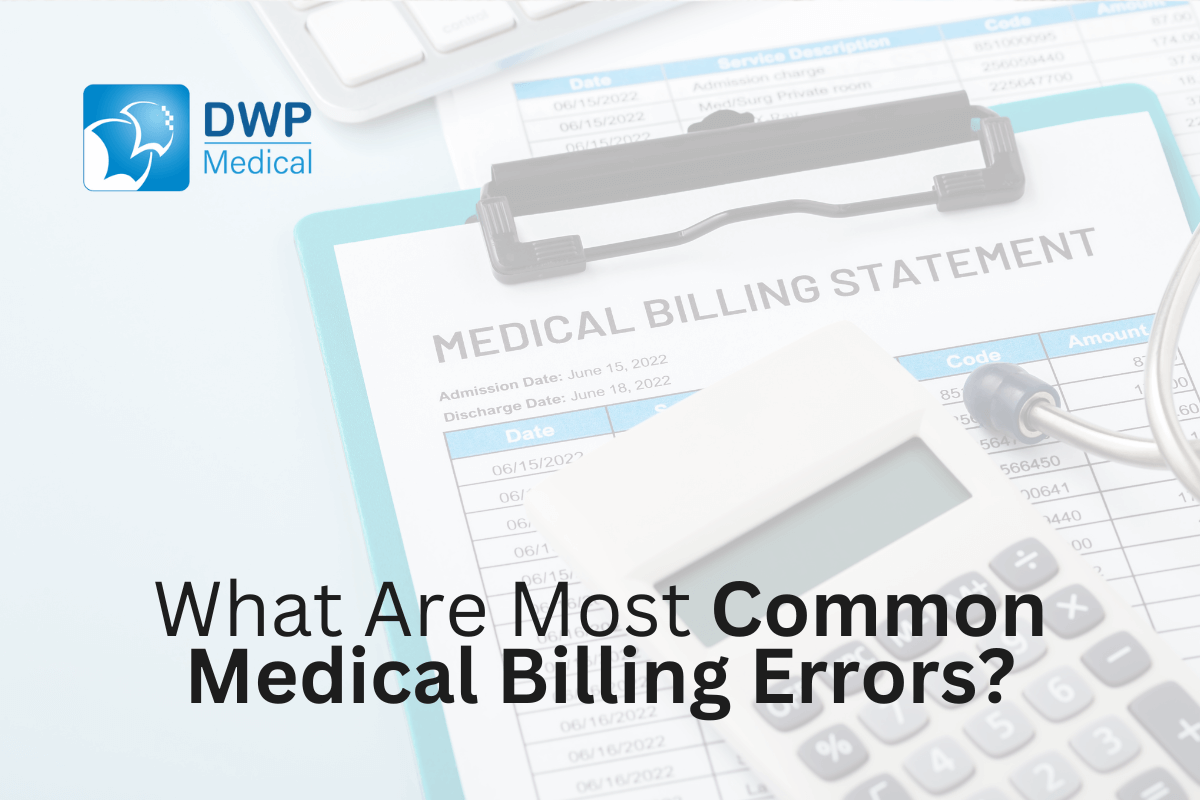Medical billing and coding errors are considered to be quite common and costly for both, health care organizations and their clients. Some of these errors cause claim denials, delayed payments, and increased avoidable healthcare costs, making it a more delicate issue.
These mistakes explain whether as a result of human mistakes, computing problems, or confusion, these barriers prevent the correct financial operation in health care. It is necessary to know and analyze the primary medical bill errors that might be made to prevent them at work and increase organizational performance.
Keep reading and get to know about some common medical billing pitfalls and how to avoid them to achieve a well-organized revenue cycle.
What is a Medical Billing Error?
A medical billing error then refers to a situation where there is a misunderstanding in the preparation, submission, or working on the healthcare claims for payment. It can occur at any point within the billing process – a clerk miss-writing a patient’s diagnosis or treatment, an incorrectly filed and /or missing charges, or out-of-date insurance data.
Failure to bill for medical services appropriately is a common phenomenon leading to denied claims, delayed payment, or even billing the patients more money, on top of the complicated health journey.
Medical Billing Error Statistics
It is seen that medical billing errors are much more common than most people would guess. According to research, there may be up to an 80 percent error rate in people’s medical bills.
The AMA identified that 1 in 5 people claims that healthcare providers’ bills contain some type of error. These actual billing mistakes may result in overcharging, denied claims, or delayed payment which affects others in the system in the healthcare sector.
An MGMA poll showed that 69 percent of organizations claimed that average denial rates rose to 17 percent in the year 2021 alone.
Here are a few more statistics:
- According to data collected in 2021, there were more than 48 million claim denials.
- For every main claim, an average of 19 percent is rejected and of this, between 40 to 60 percent are not again submitted.
- Rejection rates are up to even 80% for some payers.
- It is believed that about 40 percent of the denials could be reversed if the appeals are done right.
These mistakes are the result of medical billing and coding errors. Those are minor clerical mistakes for instance entering the wrong details about the patient wrong billing code numbers or major problems such as wrong coding systems.
These medical billing coding errors provide a significant expense to the community, prove to be problematic for everyone in the healthcare field, and ultimately pass on the costs back to the patient. Correction of these errors is essential to minimize the time spent on billing and gaining timely and uncomplicated payments from the patients.
Common Medical Billing Errors
Here are some of the medical billing mistakes most often encountered along with the likelihood of the consequences. Every medical bill mistake listed below can have its effects.
-
Incorrect Patient Information
One of the most common medical billing and coding errors is when patient information like name, date of birth, or insurance lineage of the patient is keyed in wrong. These errors can result in denial of claims as insurance companies use the details of the patients to process the claims.
-
Coding Errors
Most medical coding mistakes result from improper coding of diagnoses or procedures. Coders may use an incorrect code by their ignorance, misunderstanding of details in the medical record, or by using an old code book. This may end in underbilling, overbilling, or claim denial. These mistakes have made it imperative that coders should be trained well and should be up to date on the relevant coding rules.
-
Lack of Pre-Authorization
Some treatments, tests, and medical procedures are billed only after receiving authorization from the insurance companies. Not getting this approval can lead the health care provider to lose funds through rejected claims thus the need to ensure one gets this approval. Providers need to always check on the coverage of certain services and obtain any permission needed before offering the services.
-
Duplicate Billing
This is where the provider submits multiple billing for the same service, through different account numbers. This can be due to some normal course of the administrative process or a mistaken input in the system. The problem of duplicate billing even annoys patients, results in improper payments, and unnecessarily delays cash reimbursement.
-
Incorrect Procedure Codes
Standard medical billing coding mistakes may include the wrong code applied to procedures delivered. When the procedure code does not match the service offered, the claim attracts the wrong payout or even exclusion. These kinds of mistakes might be minimized through efficient audits and training.
-
Misuse of Modifiers
Modifiers are used in medical billing to include extra information about the service or procedure, something about the service or procedure being changed in some way. The omission of these modifiers leads to either low charges or complete rejection of payment.
-
Outdated Insurance Information
This is because the submission of damaging information regarding an insurance claim includes outdated insurance details that result in denial and slow payment. Responsible contact with the patients and confirmation of their insurance details is quite essential in billing.
-
Lack of Documentation
Lack of documentation or at times even inadequate documentation is likely to foster mistakes in medical billing and coding. Proper documentation is mandatory in a healthcare organization since all the services offered should be well substantiated by the claims that are presented. The absence of proper documentation is equally likely to cause disagreement with insurance companies and delays in reimbursement.
- Incorrect Charge Entry
Charge entry mistakes occur when incorrect charge amounts are recorded against any services provided. This can be as a result of clerical mistakes, or misunderstandings that deal with the price structures. Such errors can however be eliminated by making sure that the billing staff receives up-to-date information about the prices charged.
-
Not Appealing Rejected Claims
It emerged from the study that healthcare providers do not follow up or appeal a claim once it has been denied. It also means that companies may lose revenue when they do not explore an error’s root cause and fix it. Since follow-ups on claims that have been denied are relevant to maximizing reimbursements, they need to be part of the claims management system.
These errors must not be overlooked by any healthcare provider who desires to put up an effective billing system. However, there are various tips for achieving success in medical billing and coding including, offering training, proper storage, updating, and care of patient data. Medical billing and coding errors can be minimized guaranteeing high customer satisfaction and health finance.
Tips to Avoid Common Medical and Billing Errors
Here are some practical steps to avoid these common mistakes:
-
Regular Staff Training
Billing and coding staff should always be updated with the right coding rules, codes, laws, and policies that govern the health sector. If the medical billing personnel attend training sessions often this will help in minimizing errors that are caused by a lack of updating knowledge or wrong coding system.
-
Follow Documentation Protocols
Healthcare providers should make sure all services and procedures are well recorded in the best way possible. Documentation is critical to ensure that accurate billing is done, and there are limited occasions that a person will contest the amount charged.
-
Perform Regular Audits
Performing monthly billing records checks across different specialties will assist in preventing most medical billing and coding mistakes. Performing these audits helps ensure the marks are identified and corrected before becoming problematic trends affecting claim reimbursement, leading to denials.
-
Verify Patient Information
Keeping the patient’s information accurate and up to date also goes a long way in avoiding medical bill errors. Ideally, staff members should verify the specific data that is highly important concerning the insurance policies of the respective patients, birth dates, and contact details before submitting the claims.
Medical Billing Errors and Patients’ Rights
When errors are made in a medical bill, a patient has the opportunity to protest charges and request a change.
-
Right to an Itemized Bill
Consumers have the right to receive a bill that explains the amount of money they will spend for the services, products, equipment, or treatment they receive. This enables them to review the service, and audit in order to look for the medical billing services and errors such as charges duplication and incorrect codes.
-
Right to Contest a Mistaken Bill
There are always reasons why some patients believe that they do not deserve to pay the full amount they’ve been billed. And if a patient spots a medical billing coding inaccuracy or any other mistake on their bill, he or she has the right to appeal for the charges.
-
The Right to Appeal Denied Insurance Claims
In case of denial of claim through medical billing errors, patients have the right to appeal. They may have to provide some other proof or would require the assistance of the healthcare provider to rectify the error and forward the claim again.
-
Right to Financial Assistance
At times it is possible to negotiate for fee waivers or financial schemes, especially when the patients have received huge invoices full of medical billing and coding mistakes. Patients are sometimes by kept incompetent about these possibilities or are directly told by providers.
However, to prevent medical billing errors patients should also pay attention. There are multiple ways for patients to avoid such medical billing and coding errors. These may include double-checking your bills to check that everything is accurate, reviewing health insurance information on file, and getting explanatory statements.
FAQs
About what percentage of medical bills have incorrect charges?
Some surveys indicate that up to 80% of what people are charged for have billing mistakes. These errors run the risk of being as insignificant as data entry mistakes or as significant as charges and claims issues.
In what ways does AI help reduce medical billing errors?
AI assists in minimizing medical billing errors by coding and detecting odd claims and any possible errors are efficiently flagged before they are submitted. It can increase the level of reliability, as human mistakes in billing processes are minimized.
What is the law in Texas for medical billing?
In Texas, patients can challenge billing errors. Healthcare providers have to file proper claims and correct mistakes in the claims as well. Moreover, patients are protected against surprise billing as well by Texas which governs fair handling of billing disputes.


